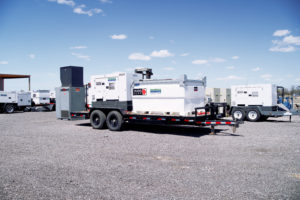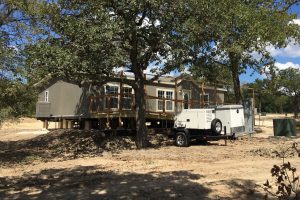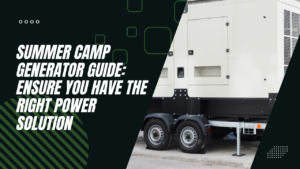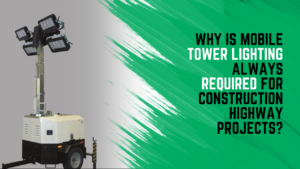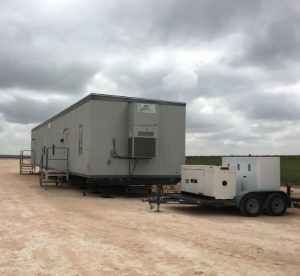Reliable power is critical for summer camps to run lighting, fans, kitchen appliances, PA systems, and other electrical equipment that make the camp experience safe and enjoyable for campers. Having backup power ensures camps can continue normal operations during utility power outages and provides electricity for outdoor activities away from buildings. This guide covers key considerations for properly sizing and selecting the best portable generator to meet the unique power needs of camps.
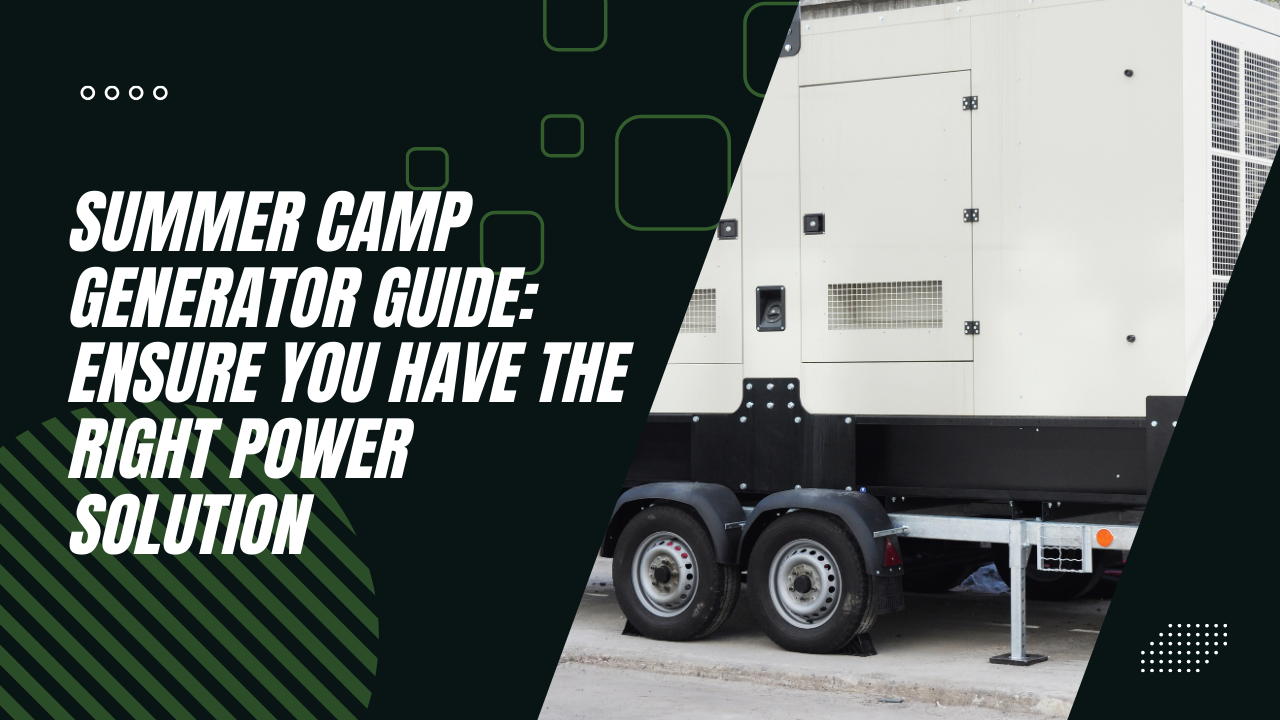
Key Factors for Selecting Camp Generators
- Output Wattage: Carefully calculate the starting and running watt loads of essential electrical devices to size the generator. Also factor in future expansion.
- Safety Features: Choose portable generators with protective features like low oil auto shut-off, overload protection, and steel cages for outdoor use.
- Sound Levels: Look for “super quiet” generators rated under 65 decibels to prevent disrupting camp activities.
- Fuel Efficiency: More fuel efficient generators save on energy costs over repeated uses. Propane or natural gas units are cleaner and require less maintenance than gasoline.
Generator Power Needs for Summer Camps
A typical summer camp can use thousands of watts of power per day on:
- Cabin lighting, and fans – Used during downtimes, at night, and for unseasonably hot days. Figure 500-1000 watts for a 4-cabin sleeping area.
- Dining hall – With commercial appliances like refrigerators, freezers, and multiple lighting banks. Around 2000+ watts are needed.
- Kitchen – Major appliances like ovens, dishwashers, and ventilation hoods have high starting power draws. 5000+ watt generator needed.
- Maintenance areas – For power tools, battery charging stations, hazard lighting. 2000-3000 watts
- Medical station – Essential to keep vaccines refrigerated and equipment operational. 1000 watts
- Activities/events – Inflatables, carnival rides, PA systems, and lighting rigs can require 5000-10000+ watts depending on size.
To determine the total generator size needed for daily camp usage, tally the critical systems across these areas. Also, factor in any special events like movie nights that may overlap kitchen/cabin usage. An oversized generator ensures all systems can run simultaneously during peak demand.
For short-term event power needs, you may only need a smaller generator run for a defined window, combined with conservation of nonessential usage to stay within the generator’s wattage limits. Load balancing across multiple smaller generators is another option.
Portable Generator Types
Two main portable generator technologies to choose from, each with pros and cons:
Conventional Generators
- Powered by gas engines
- Lower upfront cost
- Noisy – Typical 65-75 dBA
- Higher emissions
- Less fuel efficient
Inverter Generators
- Advanced power inverters for cleaner electricity
- Ultra-quiet – Under 60 dBA to as low as 48 dBA
- Fuel efficient – Can run up to 8 hrs on 1 gallon of gas
- Pricier than conventional
- Lower wattages available
Within these categories you’ll also find options like:
- Electric Start vs Pull Start – Turnover easier, no cord resistance
- Power Output – Light duty under 3000W to industrial models over 10,000W
- Voltage – Standard 120V up to 240V for running well pumps, HVAC
By balancing factors like sound, emissions, and fuel usage against upfront costs, an inverter model is generally the best fit for camp usage.
Important Generator Features for Camps
Quiet Operation
A generator’s noise rating, measured in decibels (dBA), directly impacts where and how it can be used at your camp. The sound output should factor highly in your selection.
Per OSHA noise guidelines, under 70 dBA is considered safe for lengthy exposure without hearing protection. Every +3 dB doubles the noise intensity, so a 4000W conventional generator at 72 dBA makes over twice the noise of a 48 dBA-rated 2200W inverter unit.
For camp sleeping quarters, the sub-60 dBA levels of an inverter model are critical if the generator will see overnight use.
Soundproofing options like generator enclosures can lower noise an additional 10-25 dB. factor them into your budget if your selected generator has borderline noise levels.
Runtime per Tank of Fuel
Understanding a generator’s fuel efficiency helps estimate operating durations and how much gasoline you’ll go through in a season.
An entry-level conventional generator will run 3-6 hours on a tank – sufficient for shorter disruptions but limiting for extended outages.
Advanced inverter generators can extend up to 8-12 hours per tank. When paired with automatic start/stop features to conserve fuel during non-peak demand, they offer flexibility for long events without constantly refueling.
When sizing fuel needs, assume 30% lower efficiency under real-world conditions than marketing claims. Stock double the volume of gasoline you’d expect to use to account for greater than-expected runtimes and avoid depletion during critical usage periods. Rotate stock monthly to keep fuel fresh.
Safety Features
Reputable generator brands build their models to meet key safety certifications that minimize risk:
- UL, CSA, ETL – Indicators it meets North American electrical standards
- CARB, EPA – For lower emissions critical in camp environments
- OSHA – Noise emission standards for safe long-term exposure
- Additional tip-over, low-oil auto shutoff protections
Investing a bit more in certified models brings peace of mind your camp’s generator is designed and tested for safe operation.
Powering Camp Sleeping Quarters
Small portable generators can power a single cabin’s basic electricity needs, including lighting, fans, and device charging. For expanded capacity across a multi-cabin sleeping area:
- Position the generator centrally to reduce cord distances
- Use heavy 12-14 gauge extension cords to minimize voltage drop over long distances
- Outdoor-rated power strips add more outlets as needed to connect multiple devices
- LED string lights minimize electricity usage compared to incandescent bulbs
Proper cord management is crucial for safety and functionality:
- Brackets and cable ramps can keep cords organized and off the ground
- Bright markings or tape make tripping hazards clearly visible at night
- Inspect cords regularly for damage to the insulation or exposed wiring
- Unplug appliances when not in use to conserve generator fuel
By planning the layout ahead of time and utilizing heavy-duty components, a portable generator can effectively deliver power across a campground without issues. Taking basic precautions for cord safety also ensures the system poses minimal risks to campers.
Servicing and Maintaining Camp Generators
Routinely inspecting, cleaning, and servicing your camp generator is crucial to keep it operating optimally for powering your off-grid adventures. Follow these generator care tips:
Sheltering
- Shield the generator from outdoor elements like rain and snow whenever possible. Use canopy tents, pop-up shelters, or DIY enclosures. This protects sensitive parts from moisture damage.
- Place on a pallet or block of wood to prevent water from pooling underneath if outdoors.
Security
- Secure the generator with a lock to prevent theft when unattended. Anchor to a tree, trailer hitch, or concrete block. Store inside a shed or vehicle when not in use.
Exterior Care
- Wipe the exterior clean before and after each use. Remove any accumulated debris, dirt, sap, and animal nests. This prevents engine overheating.
- Check that ventilation openings on the generator body are clear of obstructions. Clogged openings can cause overheating.
Air Filter
- Check and replace the air filter regularly if it looks dirty. A blocked air filter negatively impacts engine performance and can cause damage over time.
Oil Changes
- Change the oil after the first 20 hours of use on a new generator. Then follow the manual’s guidance, usually every 50-100 running hours. This prevents sludge buildup.
- Check oil level before each use and top up as needed. Running low on oil can damage internal components.
Fuel System
- Inspect fuel lines and tanks periodically for cracks or deterioration which can cause leaks.
- Drain old gas and add fresh fuel at the start of each camping season for best performance.
Electrical Safety
- If equipped with GFCI outlets, test them before each use by pressing the “Test” and then “Reset” buttons to confirm safe operation.
Battery and Tune-ups
- Replace the starting battery every 2-3 years for reliable electric starts.
- Technicians can perform periodic tune-ups, spark plug checks, carburetor adjustments, and other maintenance annually or after every 100-300 hours of runtime (depending on use) for peak generator conditions. This prevents issues down the road.
Following basic generator maintenance and care, guidelines keep your equipment running smoothly, prevents many issues, and ensure reliable power for off-grid living and adventures. Consider keeping a generator service log to track runtime hours and maintenance tasks.
Conclusion
Invest in Quality and Reliability
For a camp setting with high electrical demand and limited grid power as a backup option, investing in a robust, reputable generator brings significant peace of mind. Carefully weighing factors like sound levels, safety certifications, and reliable power output ensures your camp activities won’t miss a beat when you lose utility electricity.
If you need assistance selecting and installing the properly sized generator for your camp, Contact us at JC Davis Power about lighting tower and generator rentals tailored specifically to your camp’s needs. Our team brings decades of experience matching portable power equipment to unique usage applications – we can help ensure you choose the perfect generator to keep your summer camp running this season.
